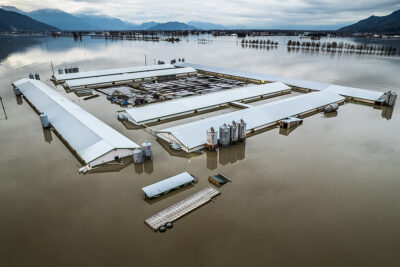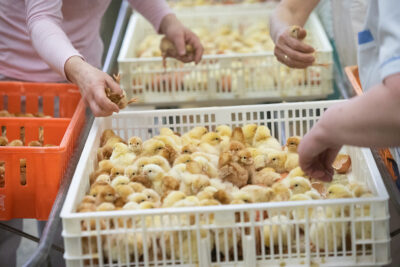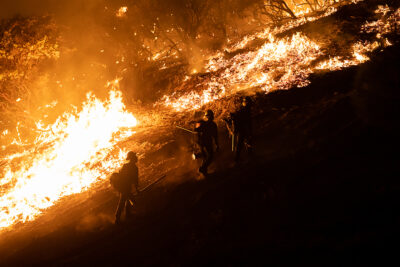We are living in a world increasingly affected by climate change and other forms of environmental damage. Droughts, floods, famines, tsunamis, and forest fires are already occurring with increasing regularity, and the trend will only continue from here. Both humans and the animals we share the planet with are facing new threats to our ways of life.
Change is necessary, both via government regulation and through consumer habits. Eating meat is frequently touted as the best way to reduce your environmental footprint by climate scientists and journalists, but why? How can a food as common as meat be so harmful to the environment?
HOW DOES EATING MEAT AFFECT THE ENVIRONMENT?
Eating meat affects the environment in a variety of ways, from greenhouse gas emissions to water pollution and biodiversity loss. The practices and scale of modern meat production mean that there is no sustainable way to satisfy existing demand for meat.
HOW DOES THE MEAT INDUSTRY CONTRIBUTE TO GLOBAL WARMING?
The meat industry is one of the largest polluters on Earth, responsible for at least 16.5 percent of the human-caused greenhouse gases released into the atmosphere — more than all the cars and planes in the world combined. It gets worse. The meat industry releases a disproportionate amount of methane, an especially potent gas that traps heat 84 times more effectively than carbon dioxide over the first 20 years.
Why? Well, the digestion of cows, sheep, and goats involves a process called enteric fermentation that produces methane that the animals belch out. Lots of it. In fact, a single cow can emit 100kg of methane per year. There are other problems with the meat industry too, including burning feed crops after harvest, improper manure management, and land use change.
While cows are the biggest offender, all forms of animal agriculture release more greenhouse gases than plant-based agriculture, whether producing dairy, eggs, chickens, pigs, sheeps, or goats.
HOW DOES EATING MEAT CAUSE DEFORESTATION AND FOREST FIRES?
Raising animals requires far more land than growing plants. This is because animals require food throughout their lives and the animal agriculture industry is responsible for growing crops like soy, alfalfa, or corn to feed their animals in addition to the space required for factory farms, slaughterhouses, and pastures.
According to data scientists, approximately 3bn hectares of land could be rewilded if the world replaced animal agriculture with plant-based agriculture systems. That’s an area the size of Brazil and all of North America combined. All of this land for farming animals requires deforestation on a massive scale. Beef production alone is responsible for about 70 percent of the deforestation in the Amazon rainforest and about 41 percent of all deforestation worldwide.
HOW IS EATING MEAT RESPONSIBLE FOR HUMAN RIGHTS ABUSES AND LAND-GRABBING?
The meat industry frequently infringes on human rights, especially Indigenous rights and workers’ rights. To fuel its land requirements the industry will often take land, illegally or legally, from protected areas or from Indigenous peoples. For example, land from the Mỹky people of what is now Amazonian Brazil was stolen from them for cattle pastures. This meat was then sold to consumers worldwide. Many Indigenous activists are calling out the meat industry for expanding soy and cattle farms and infringing on their land rights.
The meat industry also abuses its own workers, often by underpaying them, making them work too fast in slaughterhouses, and causing them injury or trauma. Because slaughterhouse work is so unpleasant, the meat industry tends to recruit those most vulnerable, like people of color, immigrants, and Indigenous people.
HOW DOES EATING MEAT KILL WILDLIFE?
The meat industry is also threatening biodiversity as an indirect result of its expansive land use.
Right now, the beef and pork industries are causing an estimated 43 percent of species loss in the EU, for example. On this path, by 2050 the meat industry will have destroyed the habitats of 17,000 species worldwide, bringing them closer to extinction.
Unfortunately, even the farms touted as “climate-friendly”, like ranches or regenerative agriculture meat farms, are still quite harmful for local biodiversity.
Any biodiversity solution needs to include reducing animal agriculture, otherwise biodiversity hotspots will continue to be destroyed.
IS EATING MEAT INCREASING THE RISK OF FUTURE PANDEMICS?
When one reels off the names of major pandemics — bird flu, swine flu, and of course, Covid-19 — it’s hard to miss that they all share a common origin: animals. Zoonotic diseases, which are diseases that jump from animal to human, are made more likely by the meat industry — 75 percent of new infectious diseases are zoonotic in origin, and many can be traced back to our meat-heavy diets.
Factory farms crowd animals together in tight quarters, allowing diseases to spread easily and mutate, as in the 2022 avian flu pandemic. The meat industry’s deforestation also changes habitats and wildlife behaviors, causing them to come into contact with humans and potentially spreading more disease. Despite the Covid-19 pandemic and the devastating effects of avian flu on birds worldwide, the global meat industry has seemingly remained uninterested in changing their approaches to mitigate risk.
HOW DOES NOT EATING MEAT HELP THE ENVIRONMENT?
Reducing meat consumption has been shown to reduce the meat industry’s production over time and therefore its environmental damage. Estimates vary, but according to economists Jayson Lusk and F. Bailey Norwood eschewing 1kg of beef is likely to mean that 680g less beef will be produced within five to ten years.
There are indirect benefits as well. Eating less meat can encourage your friends and family to eat a little bit less too. Slowly shifting norms regarding meat and dairy can cause others to become more open to the idea of changing their habits.
Of course, individual action is best paired with systemic change. If you are passionate about using your voice to stop the destruction of the meat industry, consider talking to your MP about agriculture legislation, supporting vegan or climate campaigns, or donating to meat farm conversion projects like Transfarmation.
WHAT ARE THE ARGUMENTS FOR AND AGAINST EATING MEAT?
WHAT ARE THE ARGUMENTS FOR EATING MEAT?
THE NUTRITIONAL VALUE
For most people, meat can be part of a healthy diet. Meat is a good source of protein, iron, zinc, and B vitamins.
CULTURE AND SOCIETY
For many individuals, meat is heavily associated with culture, tradition, and family. Most people can probably conjure up a memory of a parent or grandparent toiling over a beloved family dish that is centered around meat.
TASTE
The most obvious reason humans eat meat is because it tastes good. It is a part of many classic dishes and many people would list a meat-centered dish as their favorite food.
WHAT ARE THE REASONS TO STOP EATING MEAT?
HEALTH RISKS
In recent years, we have learnt more about the potential negative health aspects of eating meat. Meat and animal products are associated with an increased risk of developing certain cancers, including bowel and stomach cancer, leading the World Health Organization to classify red meat as “probably carcinogenic” and processed meat as “carcinogenic”.
Meat has also been regularly linked to heart disease and to increased LDL cholesterol, blood pressure, hypertension, and inflammation. A plant-rich diet of minimally processed foods in conjuction with a healthy lifestyle has been known to reverse these effects. Meat has also been linked to type 2 diabetes and Alzheimer’s.
Many top athletes are eschewing meat for their performance, like Olympic weightlifter Kendrick Farris, record-breaking ultra runner Scott Jurek, or tennis champions Venus and Serena Williams. While the average person is unlikely to perform their incredible feats, a well-planned vegan diet can support and potentially improve any form of exercise.
It is important to note that human health is complex — one switch is not a magic cure for any ailment and every human body is different. But one researcher aptly summarises food-related health advice in a famous quote: “Eat food. Not too much. Mostly plants.”
ANIMAL WELFARE
From birth until death, animals raised for food face many horrific practices. Most animals are separated as soon as biologically possible from their mother, creating emotional scarring for both the mother and the child. They are given a steady stream of fattening food and water, and sometimes hormones, designed to make them grow far faster than is natural, often leading to broken bones and other injuries. They often live together in extremely tight quarters, given little access to sunlight, and deprived of an environment that could support their natural development.
When it comes to slaughter, animals are known to suffer, even at slaughterhouses that claim to use “humane” killing techniques. Animals are known to squeal and bellow in terror, and thrash around, fully conscious of their pain. Worse, the animals waiting in line are usually aware of the fate awaiting them.
Animals like chickens, cows, and pigs are incredibly bright and social creatures, capable of solving puzzles, playing together, and empathising with one another. The same way a dog may be able to notice when their human is feeling down, pigs may use empathy to resolve conflict within peer groups. The same way a cat loves playing around the house, chickens are known to frolic with toys outside.
SUSTAINABILITY
The meat industry is inherently inefficient, requiring far more land, water, and resources than plant-based agricultural systems. Right now, we have enough food for everyone on Earth (although this food is not evenly distributed). However, this won’t remain the case if the human population continues to grow and our meat consumption stays the same or continues to increase.
By 2050, the population of the Earth will be roughly 9.1 billion people, who will need an estimated 70 percent increase in agricultural output. Put simply, meat is too inefficient to sustain these increases.
Many advocates working on global poverty are trying to reduce people’s meat intake and boost plant-based agriculture, to create more food for the world’s population. Meat is not a sustainable system.
ENVIRONMENTAL IMPACT
Meat is not only inefficient, it also does positive harm to the environment via pollution, deforestation, greenhouse gas emissions, and land degradation. By giving up meat you become part of the solution to all these negative environmental impacts.
SHOULD I STOP EATING MEAT?
What to put on your plate is a personal and sometimes difficult decision; meat is entrenched in many cultures and in our habits, but it is becoming increasingly obvious that animal agriculture is responsible for massive environmental problems, many health risks, and egregious abuses of animal welfare. At every level, from the individual pig who is scared of death to the entire Amazonian rainforest under threat from the beef industry, meat is becoming difficult to justify.
If you are thinking of reducing or eliminating your meat consumption, there are a number of ways you can approach this transition. Create a support network, either virtually by joining newsletters or online forums about the topic, or by grabbing a friend or partner to accompany you along the journey. You can join popular movements, like Veganuary or Meatless Mondays, as a way to begin the process.
You should also think critically about how you will replace meat in your diet. Many consumers enjoy meat alternatives, like plant-based burgers, chicken nuggets, or pork products, because they mimic the texture and taste of meat without the negative aspects. You can also follow popular vegan chefs, like Tabitha Brown or the Korean Vegan, for recipe inspiration.
CONCLUSION
Change is needed to stop environmental harm to our ecosystems and to humanity’s future. Agriculture is no exception. iIn fact, scientists have shown that even if we threw the kitchen sink at stopping climate change — with electric cars, more public transportation, and less factories, among other measures — we would still fall short of the 1.5C Paris Agreement if we continued eating meat at our current rate.





